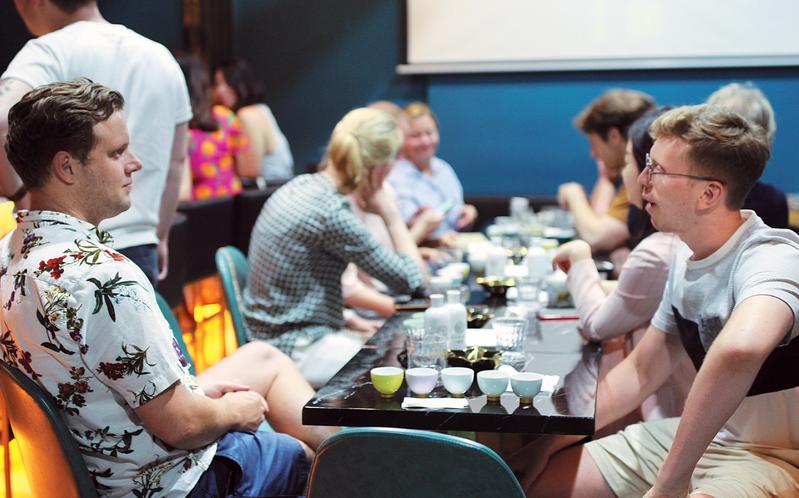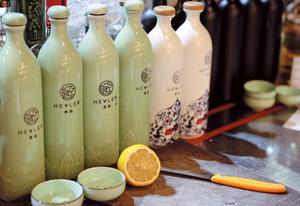Despite the ongoing pandemic, global interest in Chinese 'white liquor' has barely waned, with dozens of cities around the world celebrating World Baijiu Day, He Qi reports in Shanghai.
 Participants enjoy baijiu, or white spirits, at a masterclass on World Baijiu Day at Healer Bar in Shanghai on Aug 9. The bar was one of many venues around the world that took part in the festival. (HE QI / CHINA DAILY)
Participants enjoy baijiu, or white spirits, at a masterclass on World Baijiu Day at Healer Bar in Shanghai on Aug 9. The bar was one of many venues around the world that took part in the festival. (HE QI / CHINA DAILY)
To most foreigners, baijiu is better known for its intensity and efficacy in causing a hangover than as a complex Chinese spirit worth savoring.
Time magazine once dubbed the spirit "sorghum firewater" because of its fiery flavor.
Han Ling, the founder of Healer Bar in Shanghai, is among the many who are trying to correct this misconception.
It is important to let people try baijiu in different ways, such as in cocktails, infusions and foods, as this will help to broaden the audience and allow people to discover its diversity
Jim Boyce, Canadian alcohol expert
On World Baijiu Day on Aug 9,Han hosted a masterclass where she mixed baijiu with ingredients such as rose, elderflower liquor, cinnamon, lemon and Bohea, a black tea blend from the mountains of Wuyi, to create cocktails that would allow participants to better understand the taste of this oft-misunderstood Chinese spirit.
During the class, Han also delved into the history of baijiu and its production and preservation processes. Guests then got to sample different types of the spirit.
Fermented and distilled from wheat or a mixture of sorghum, rice, corn and barley, baijiu was first made 5,000 years ago. Today, China has more than 10 types of baijiu that come in different flavors and aromas.
"The beauty of baijiu lies in its old nature. Chinese like traditional flavors and baijiu has exactly that,"Han says.
"The production techniques for baijiu are quite unique as well. While the flavor of whiskeys and wines are affected by the type of barrels they are stored in, you only taste the grain in baijiu."
Han, who has participated in the past three editions of World Baijiu Day, says the response to her events every year has been improving.
"So many people want to know about baijiu these days. When we had a World Baijiu Day event at the bar in 2017, there was a long line of people waiting to enter," she recalls.
 (HE QI / CHINA DAILY)
(HE QI / CHINA DAILY)
Her tiny bar that measures only about 80 square meters was again fully occupied on this day. The majority of the 30 guests, all of whom watched her demonstration intently, were foreigners.
Among them was Alexa Camus, whose family business represents famous Chinese baijiu brand Moutai in foreign markets. Having lived in Shanghai since 2001, the Frenchwoman says she loves the complexity involved in baijiu production.
"Making baijiu is an art. Compared to many other types of spirits, baijiu is more complex in terms of production, which is more labor-intensive. The spirit also has an incredible variation in flavor profiles," she says.
In fact, World Baijiu Day was also started by a foreigner-Jim Boyce, a Canadian alcohol expert who is based in Beijing.
"China makes the vast majority of baijiu in the world-about 10 billion liters every year. We aim to make baijiu, the spirit more common than vodka, whiskey or rum, but little known outside China, better known," says Boyce.
"People just need the chance to try baijiu in a comfortable way," he adds, referring to events like the one hosted by Healer Bar.
"Many foreigners in China have a negative impression of the spirit because of heavy-duty ganbei (bottoms-up) sessions and because they have only tried a brand or two. Many foreigners outside China haven't tried baijiu at all.
"It is important to let people try baijiu in different ways, such as in cocktails, infusions and foods, as this will help to broaden the audience and allow people to discover its diversity."
Healer Bar was just one of many venues around the world that took part in the festival. According to Boyce, 21 cities across the world, including Beijing, Christchurch, Chengdu, Guangzhou, Hamburg, Los Angeles, Singapore and Wuhan, held different events on this day to promote this spirit.
"It is amazing that we have so many cities participating this year despite the pandemic. Some cities, like Melbourne, which is on lockdown, aren't able to hold offline events, but they still participated by holding online ones," says Boyce.
"We had far more people sending messages and photos showing them celebrating World Baijiu Day at home, sipping baijiu, making cocktails or simply enjoying it with lunch or dinner. That was nice to see."
According to market consultancy iiMedia Research, the national sales revenue of major baijiu enterprises above designated scale was 492.74 billion yuan (US$71 billion) from January to November of 2019, a year-on-year increase of 19.9 percent. Baijiu accounted for 66.7 percent of the overall alcoholic-beverage sales in the nation.
 (HE QI / CHINA DAILY)
(HE QI / CHINA DAILY)
National baijiu enterprises above designated scale produced over 5 million kiloliters from January to August, an increase of 1.27 percent year-on-year, according to the National Bureau of Statistics.
However, even though China's baijiu production accounts for nearly 40 percent of global liquor production, its international market share is less than 8 percent.
But the market share looks poised to grow further in the coming years as brands like Moutai have been increasing their foothold in overseas markets.
According to an article in The Drinks Business, an online magazine about the alcohol industry, Moutai has been promoting its brand in countries like Germany, South Africa and other nations involved with the Belt and Road since the launch of the initiative.
The company, one of China's most prolific baijiu producers, also "expects to increase its overseas sales to take up to 10 percent of its total sales by 2020", the article states.
AFP also previously reported that Moutai earned 2.89 billion yuan from overseas sales in 2018, up 27 percent year-on-year.
The spirit is also getting more popular among foreigners in China, and this could translate to them exporting their love for baijiu beyond Chinese borders, says Han.
"I think as the knowledge of this great spirit increases among foreigners, so does its popularity," says Logan Brouse, the founder of Logan's Punch bar in Shanghai, another venue that celebrated World Baijiu Day.
"Just like tequila, many have had bad experiences with baijiu. I believe this is because they have never had much of the good stuff. Baijiu, when drank with friends, is an amazing and delicious experience and most foreigners are beginning to see that now as well," he says.
Cai Xuefei, an analyst in the baijiu industry, says that getting more of the world to consume baijiu would require not just greater quantities of the spirit being shipped out, but also a concerted effort to integrate the spirit into mainstream culture and educate the public about its complexity and beauty.
Last, but not least, there is also a need to focus on exporting not just the spirit itself, but China's drinking culture.
"In foreign countries, the focus is more on bar culture and the individual," says Cai.
"In China, what matters more is getting together. In other words, foreigners get together to drink. Chinese drink because we get together."
Contact the writer at heqi@chinadaily.com.cn


